What is there to know about diabetes?
What is there to know about diabetes? 
Diagnosis of diabetes:
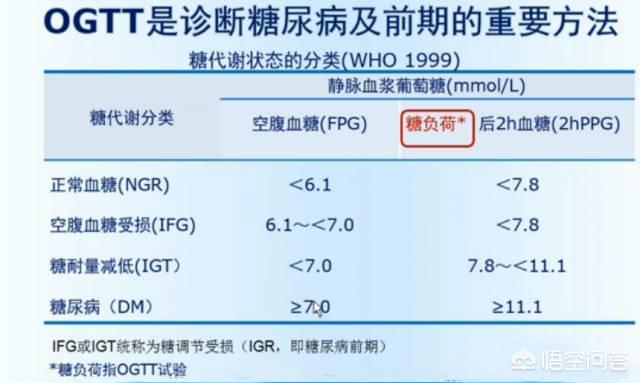
The stage of diabetes that should be taken most seriously:
Throughout the course of diabetes, the most important stage of the diseaseNone more so than the pre-diabetic stage (abnormal glucose tolerance and impaired fasting glucose).
This stage is between diabetes and normal.With a little care, you may not develop diabetes and be plagued by it for the rest of your life.
Common symptoms of diabetes:
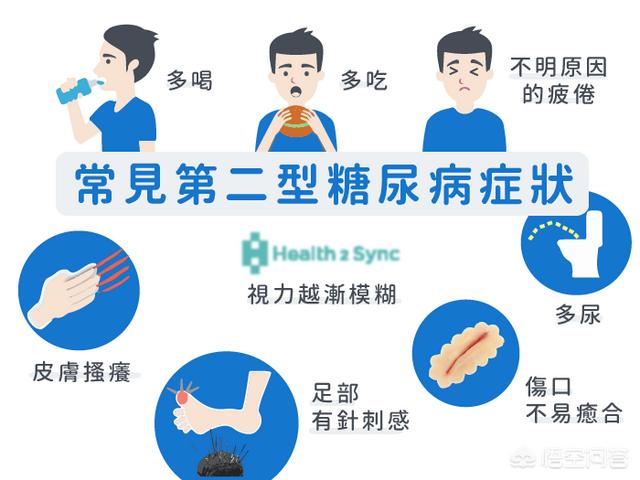
The Five Wagons of Diabetes Control:
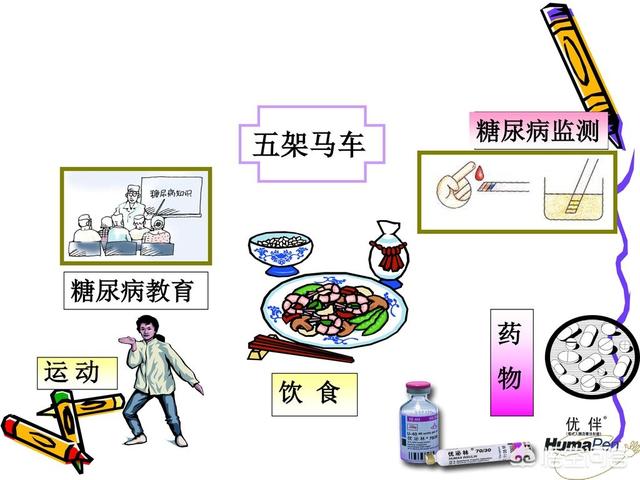
The New Five Wagons of Diabetes Control:
Cholesterol control, blood pressure control, glucose management, weight management, antiplatelet therapy
People at risk for diabetes:

Those dreaded complications of diabetes:
The scary thing about diabetes is precisely the presence of those complications.
Heart-wise, a lot of patients don't have a single symptom thatHowever, the blockage of the blood vessels in the heart can exceed 90%, and sudden death by heart attack is always possible;
Because of diabetesIt affects the nerves and makes everything sensory insensitive, even with severe complicationsFor exampleDiabetic foot patients, the diabetic equivalent of "terminal cancer."useYou can't feel your feet in boiling water, and you don't even know you've lost your toes.. Other, diabetic eye disease, and kidney disease basically don't get better once they occur.
So, here again, we emphasize that diabetes must control blood glucose, blood pressure, and blood lipids in order to slow down the progression of complications and take charge of the poor quality of life to the extreme.

Oral medications are commonly used for diabetes:
When choosing oral medications for diabetes, it is recommended that they be chosen rationally, based on the drug's glucose-lowering principle.Don't just consider the glucose-lowering effect, but consider the effect on blood pressure and blood lipids.
on account ofHow quickly or slowly diabetes and its complications progress depends not only on blood sugar controleven moreDepends on a combination of blood pressure, lipids, and other factors to reach the target. See below for specific drug descriptions.

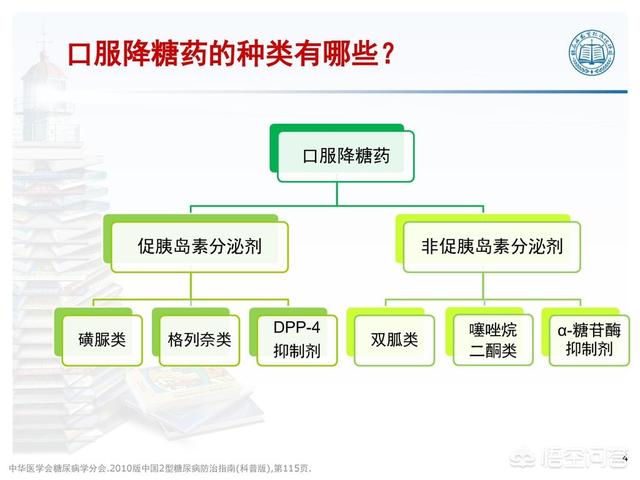
Insulin is commonly used for diabetes:
A lot of people thinkInsulin addiction is actually a big misconception, in fact, not only is it not addictive, it will be very good for controlling blood sugar.
Especially for those with new onset type 2 diabetesPatients, who are suffering because ofNew diabetic. Insulin function is fine., at which point insulin is injected to control blood glucose.It will allow the pancreatic cells in the body to rest and save the damaged cells, properly treated, will go a long time without having to take glucose-lowering drugs and oral insulin.
But many patients don't realize this.Insisting on not injecting insulin until the islet cells are completely depleted.,And all that can be done at that point is a lifelong dependence on medication to control it.
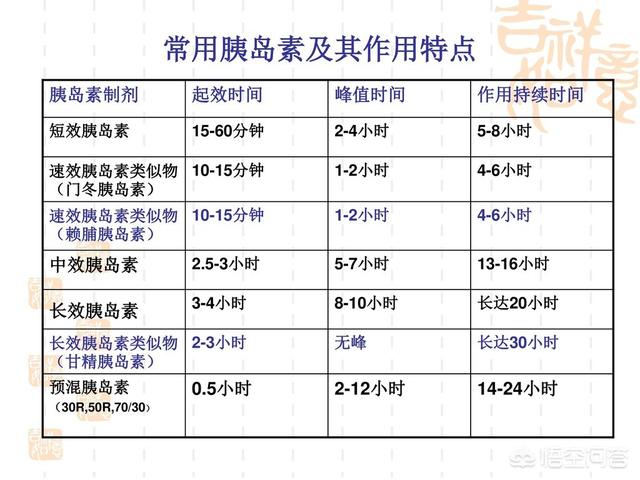
"Kudos" is a form of encouragement!
Prevention is better than cure, I hope you will cherish your health and not lose it only to regret it!
Learn the most commonly used medical facts to open up a silver lining to your health!
If you have any questions, please leave a comment.Click on the upper right corner to follow "Medical Threads."

Diabetes knowledge will cover many aspects of diet, exercise, medications, monitoring, life care, and diabetes complication prevention:
1, diet should pay attention to some of the greater impact on blood glucose food, such as sugary food, fat-rich food, this kind of food should be eaten sparingly; to choose more rich in dietary fiber is vegetables, cereals, to achieve a balanced diet, energy intake does not exceed the standard.
2, exercise can effectively reduce blood sugar, but be careful not to fasting exercise, do not exercise immediately after meals. Exercise is best chosen half an hour after meals, exercise behavior for fast walking, jogging and other aerobic exercise.
3, sugar friends do not blindly follow the trend of medication, other people suitable for their own medicine is not necessarily suitable, because the pathogenesis of diabetes is different, the choice of drugs is different. Sugar friends choose drugs must follow the doctor's instructions, especially pay attention to do not blindly pursue prescription, give up formal treatment.
Also note that do not use health products instead of drugs, if the health products claim to have the effect of lowering sugar, lowering blood pressure, lowering fat and so on, it means that they have added drug ingredients, is not formal health products.
4, life care involves a wide range of aspects, sugar lovers in daily life should pay attention to avoid emotional excitement, do not stay up late, take medication on time, monitor blood glucose on time, if found abnormal blood glucose, if necessary, need to seek medical treatment.
5, the prevention of diabetes complications, the first thing to do is to carry out regular checks, such as funduscopic examination, urine microalbumin test, electrocardiogram, thyroid stimulation test, etc., can detect lesions in a timely manner, control the progress of the disease.
6. Sugar lovers should pay attention to safety in normal times, such as avoiding falls leading to fractures, understanding the symptoms of hypoglycemic episodes, being able to detect hypoglycemic events in a timely manner, and doing a good job of preventing and controlling constipation, avoiding excessive defecation leading to cardiovascular accidents, and so on.
The best knowledge of diabetes is completely recoverable I found out about diabetes last year, preprandial glucose 22, and have diabetic feet, feet are beginning to rot so afraid, and then went to Guangdong to listen to a friend introduced to say that Professor cauldron can cure diabetes, I used his prescription, did not take drugs and did not take injections, three courses of treatment on the good, the feet are also good, and now it is a normal person, do not have to take medication and injections.
Now that diabetes has become one of the most common chronic diseases, the following should be known about diabetes:
1. The prevalence of diabetes is high, with type 2 diabetes predominating. According to the data of China's Guidelines for the Prevention and Control of Type 2 Diabetes Mellitus (2017 edition), the prevalence of adult type 2 diabetes mellitus in China (2013) is currently 10.4%. In addition to genetic factors, the incidence of diabetes is closely related to poor lifestyle, especially obesity, and the prevalence of diabetes in the obese population has increased twofold.
2, diabetes is not only elevated blood glucose, can also be said to be glycolipidemia, will cause lipid metabolism disorder, more importantly, blood glucose for years and years after the elevation of blood glucose will damage the aorta, microvessels and plant nerves, the occurrence of cardiovascular and cerebral vascular accidents, diabetic nephropathy, and other chronic complications of increased chances. It is not scary to have a momentary increase in blood glucose, but the complications brought about by a long-term increase in blood glucose.
3, diabetic diet control (calories can not be super, three meals should be even regular, pastries and other sweets to avoid mouth) + weight control + exercise is very important.
4, diabetic patients must learn to self-monitoring of blood glucose, the application of hypoglycemic drugs to be alert to the occurrence of hypoglycemia, especially the elderly patients around to always have some sugar cubes in case of emergency.
5, diabetes is not an incurable disease, effective control of blood glucose standards, can significantly delay the occurrence and development of its chronic complications.
I'm glad to answer your question. There is so much to know about diabetes that I can talk to you for three days and three nights if you move a small bench over here. Here is a brief explanation of the three aspects of diet, exercise and medication.
1. Dietary control
The key to a diabetic's diet is to control the total calorie intake in a day and diversify the diet. Everything can be eaten, but nothing can be eaten more, high sugar, high oil and high salt less touch, eat more grains and green leafy vegetables, moderate amount of milk and light tea. In addition, you also need to master some dietary skills, such as eating smaller meals, change a smaller dinner plate, drink some soup before eating, add some vinegar or lemon juice when stir-frying, and use more ginger, garlic, cinnamon and other natural ingredients for flavoring, so as to reduce the amount of salt. There are so many dietary tips out there, so keep an eye on past articles on SugarManHealth.com for more knowledge.
2. Motion control
Exercise is a proven and essential method of controlling the symptoms of diabetes. The therapeutic principle lies in the fact that exercise promotes the utilization of glucose by the muscles, resulting in a reduction in insulin consumption, thus improving the efficacy of the treatment. At the same time, exercise can also enable the muscles to utilize more fatty acids, lowering blood lipids and cholesterol, improving the body's resistance, improving general health, and reducing the risk of complications. It is recommended to exercise for one hour a day, which can be started at 0.5-1 hour after meal, consistently and gradually.
3. Drug control
There is no best medication for diabetes, only the most appropriate medication, each person's condition is different, the medication used will also be different. Do not look at what other people with what drug is good to follow with, and not without authorization to stop and reduce the drug, the drug must follow the doctor's instructions, on time and in accordance with the amount to take. In addition to buying drugs to go through the regular channels, do not believe in some of the variety of sugar-lowering miracle drug, and do not easily try some of the no scientific evidence of the prescription.
In order to control blood sugar and prevent complications, sugar lovers need to keep learning sugar control skills so that they can be healthy for a lifetime.
Sugar man health network, a temperature control of sugar platform, welcome to pay attention to the questions and answers!
Hi, Nutritionist thought that this is really quite a broad question to ask. From a medical point of view, knowledge related to diabetes, there are: screening, identification, diagnosis, the five driving forces, complications, etc.
But Nutritionist thought that as a layperson, you really don't need to know that much. All you need to know is the three levels of diabetes prevention. Why? Let Nutritionist tell us in detail:

Primary prevention, before diabetes develops
As an average person, you probably want to know the most: will I develop diabetes later in life?
Then you may need to know these diabetes related facts:
1. Am I at high risk for diabetes?
2. What is associated with the onset of diabetes?
Foster's Answer:
In response to Question 1: Obesity, high blood pressure, high blood cholesterol, irregular life, heredity, etc. are all high-risk groups.
In response to Question 2: Type 2 diabetes, the main cause of diabetes is inherited diabetic constitution, coupled with the bad habits of later life.
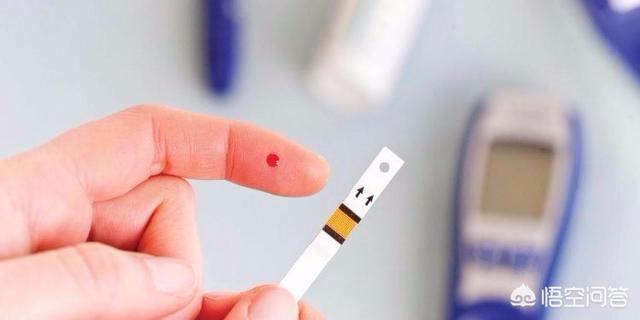
Secondary prevention, diabetes has already occurred
As a layperson, you probably want to know the most: can diabetes be cured?
Then you may need to know these diabetes related facts:
1、How to control sugar?
2. What is the diabetes quintet?
Foster's Answer:
First of all diabetes cannot be cured at this time, it can only be controlled. To control diabetes is to control blood sugar, control blood sugar you need to know that the five carriages to combat diabetes: exercise, diet, education, blood glucose testing, drugs. Specific details of the health gentleman will not go into detail.

Tertiary prevention, diabetes complications occur
As an ordinary person, you probably want to know most of all: how long do I have to live?
Then you may need to know these diabetes related facts:
1. Why did I have complications?
2. What should be done to treat the complications?
Foster's Answer:
How long you live depends on the severity of the complications. If it's caught early and hasn't caused irreversible lesions, then there's still a chance to be saved. If the blood vessels have all been blocked for the most part, it's hard to say.
In response to Question 1: Complications occur mainly because of uncontrolled blood glucose, which in turn causes lesions in the blood vessels, leading to insufficient blood supply to the organs and resulting in complications.
In response to Question 2: Glucose control is the key, and then the complications are managed symptomatically.

Nutritionist thought that the average person would know enough about these diabetes related facts for sure.
I hope the above suggestions can help you, get more information about diabetes, please pay attention to the health care fine-tuning!
1. Common knowledge
1. What causes high blood sugar?
Many foods can cause high blood sugar, but the foods we eat play the biggest and most direct role in raising blood sugar. When we eat carbohydrates, the body converts those carbohydrates into glucose, which can raise blood sugar. Protein, in large enough quantities, can also raise blood sugar levels. Fats do not raise blood sugar levels. Stress causes an increase in the hormone cortisol, which also raises blood sugar levels.
2. What is type 1 diabetes?
Type 1 diabetes is a disease in which the body cannot produce insulin.
What is insulin? Insulin is a hormone necessary for the body to move glucose from the bloodstream to the cells. All organs in the body, including the brain, heart, and lungs, are made up of cells. These cells utilize glucose for energy, which is why it is important for glucose to move from the blood into the cells.Insufficient insulin production in people with type 1 diabetes is usually caused by pancreatic problems, and type 1 diabetes is diagnosed as a permanent disease.
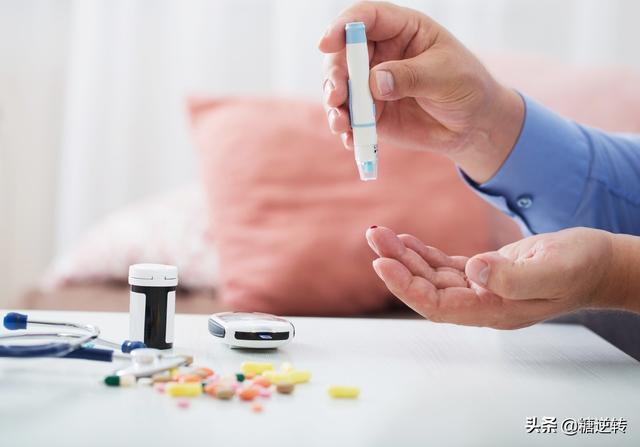
3. What is the difference between type 1 and type 2 diabetes?
Type 1 diabetes is an autoimmune disease that causes the body to be unable to produce insulin. People with type 1 diabetes must take insulin in order to keep their blood sugar levels within the normal range.
Type 2 diabetes is a disease in which the body is able to produce insulin but does not produce enough or the body does not respond to the insulin that is being produced (known as insulin resistance).People with type 2 diabetes must maintain a low-carbohydrate diet to prevent their diabetes from getting worse.
4. What should your fasting blood sugar be?
Fasting blood glucose should be less than 6.1 mmol/L to be considered normal. A fasting blood sugar of 6.1 mmol/L to 7.0 mmol/L is considered pre-diabetic. A fasting blood sugar of 7.1 mmol/L or higher is diagnostic of diabetes. If your fasting blood sugar is consistent with pre-diabetes or type 2 diabetes, it is recommended that you consult your physician.
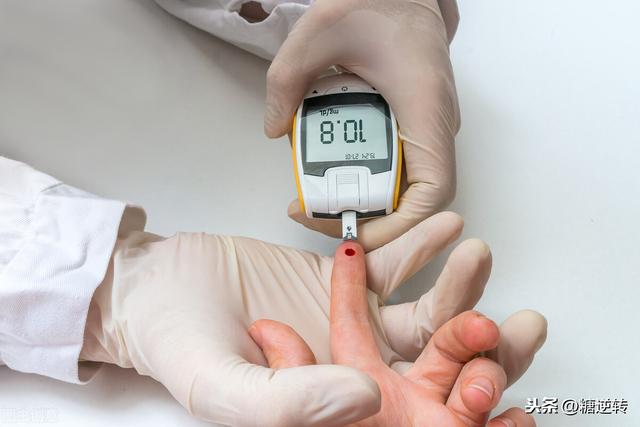
5. What is diabetic ketoacidosis?
Diabetic ketoacidosis (DKA) is a serious condition that can be caused by high levels of ketones in the blood. If not recognized and treated immediately, it can lead to coma and even death. Because the condition is so severe, patients with diabetic ketoacidosis are usually hospitalized.
When the body's cells cannot utilize glucose for energy, the body begins to break down fat for energy. When the body breaks down fat it produces ketones, and too many ketones can make the blood very acidic. This acidity can lead to coma and death.People with type 1 diabetes are at risk for diabetic ketoacidosis if they don't take their insulin, don't eat, or get sick for other reasons (such as infections).Diabetic ketoacidosis is rare in people with type 2 diabetes.
6. What are the signs and symptoms of pre-diabetes?
Prediabetes is considered one of the most dangerous precursors to diabetes because it may have no signs or symptoms. That's why it's so important to diagnose prediabetes by testing fasting blood sugar or glycosylated hemoglobin (HbA1c). Many people with prediabetes (84 million adults in the United States) have no symptoms. By the time symptoms appear, diabetes has usually progressed. In some rare cases, a person may develop complications related to diabetes, such as retinal hemorrhages, neuropathy or even stroke, and only be diagnosed with prediabetes.

7. What is the best diet for pre-diabetes?
A low-carb diet is ideal for pre-diabetes. This is because pre-diabetes occurs when blood sugar levels begin to rise and the body produces insulin in an attempt to lower them. If the body does not produce enough insulin, or if the body does not produce enough insulin to meet the demands of a high glycemic load, then blood sugar levels will continue to rise. A low-carb diet can lower blood sugar levels and keep them low.
8. How can prediabetes be reversed?
Prediabetes can be reversed with a low-carb diet. A low-carb diet lowers blood sugar levels and the body's need for insulin decreases. When lower blood sugar levels lead to lower insulin levels, this is reflected in blood test results as a reversal of glycated hemoglobin or fasting blood sugar to the normal range. Once the glycosylated hemoglobin (HbAa1c) or fasting blood sugar is normal, then it can be said that the pre-diabetes is in remission or reversal.
9. What is the usual treatment for pre-diabetes?
Some doctors may prematurely prescribe metformin to pre-diabetic patients, leaving these patients unable to reverse their pre-diabetes through dietary changes while at a high risk of developing diabetes. Many patients diagnosed with prediabetes are also told to lose weight through diet and exercise. Losing weight can also reverse prediabetes; however, the mechanism for reversing prediabetes is related to lowering insulin levels, which helps with weight loss.
Written by Decca Loves Health
sugar reversal
It is a proven method of reversing diabetes through diet globally, follow us to learn more about Sugar Reversal.
According to statistics, global diabetes in adults aged 20-79 years old, has from 151 million in 2000, to 2017 has reached 425 million, an increase of nearly two times. It is expected that by 2045, the number of people with diabetes may reach 629 million. Among them, people with type 2 diabetes is the largest proportion, the original diabetes is divided into several types? It seems that it is necessary to understand it.
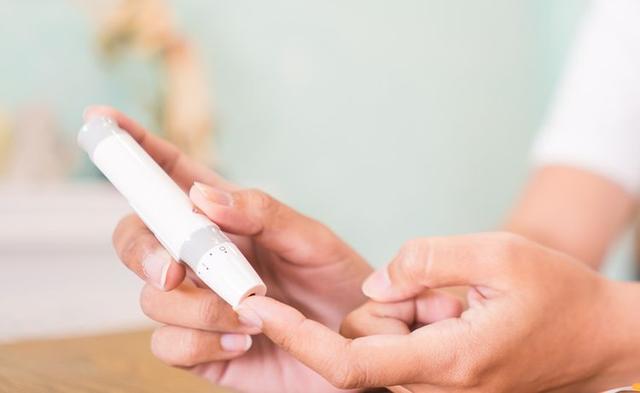
What is diabetes?
Diabetes mellitus is a disease caused by insufficient insulin in the body, or by a decrease in the ability of the body's cells to utilize insulin. Insulin is a protein secreted by the beta cells of the pancreas, which synthesizes glucose into hepatic glycogen and stores it or drives glucose from the blood into the cells of the tissues to provide the body with the energy it needs to lower blood sugar.
Generally speaking, the body uses insulin to regulate blood glucose, but when the amount of insulin is not enough or the body does not respond well to the hypoglycemic effect of insulin, glucose cannot be utilized, and the problem of high blood glucose occurs. After the blood sugar is too high, the sugar cannot be fully recovered by the kidneys and is excreted in the urine, so the phenomenon of "diabetes" occurs, which is what we call diabetes.
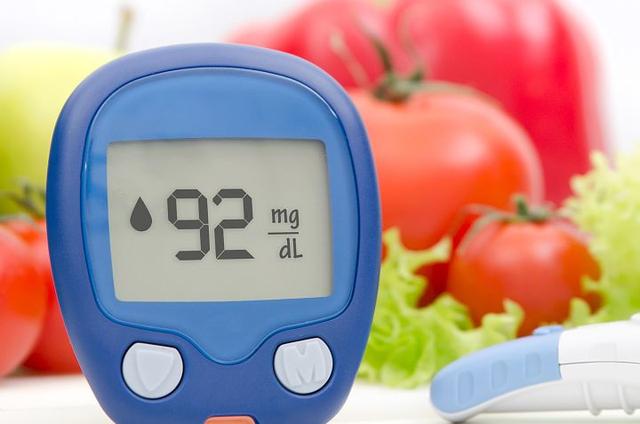
What are the four types of diabetes?
1. Type 1 diabetes, also known as insulin-dependent diabetes. Almost 5% of the total number of people with diabetes, this is a kind of autoimmune disease, the patient's body can't make insulin by itself, and must rely on extracorporeal injection of insulin in order to maintain a normal life, which is generally manifested as thirst, drinking, urinating, eating, and fatigue, wasting, and weight loss, and so on.
2. Type 2 diabetes, known as non-insulin-dependent diabetes. Occupying about 90% of all diabetes, although the body can produce insulin at this time, but the amount is not enough to reduce blood sugar, generally with mild weakness and thirst, is one of the more common types of diabetes with type 1, in addition to the genetic factors are also the latent causes of type 2 diabetes.
3. Gestational diabetes, a kind of diabetes that occurs during pregnancy and usually disappears after the birth of the baby, mainly manifesting itself in excessive drinking, eating and urinating.
4. Other types of diabetes: Diabetes is mainly triggered by other internal diseases, such as pancreatitis, etc., which makes the β-cells of the pancreatic islets damaged and unable to secrete enough insulin. In addition, medicines or chemicals may also cause diabetes. Besides the symptoms of excessive drinking and eating, there are also the characteristic manifestations of the primary disease, such as tumors, infections and other symptoms.
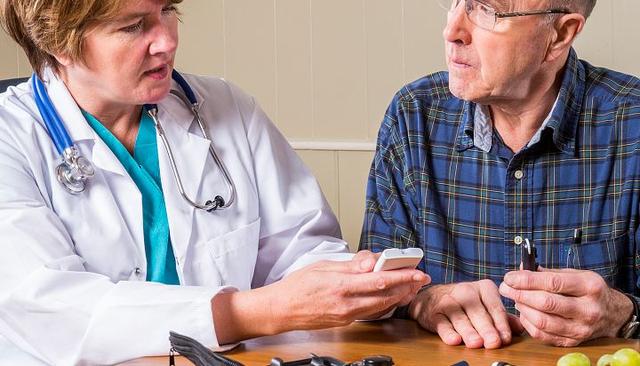
What can be done to prevent it?
1. Regular health checkups allow you to understand your physical condition, detect it early and treat it early.
2, maintain the habit of moderate exercise, maintain ideal weight, moderate and aerobic exercise can improve the body's sensitivity to insulin, it is recommended to exercise for more than 150 minutes per week to reduce blood glucose and blood lipid values.
3. Balanced nutrition without partiality.
4, more intake of food containing fiber, slow down the absorption of sugar.
5. Eat less high-calorie food to avoid accumulating body fat.
6. Reduce the intake of desserts.
7. Maintain a happy mood and a good routine.

Director Wang Shuai here to remind you, although diabetes is not a serious danger to our lives, but it will also cause some harm to the body, prevention of diabetes should start from the dietary habits and lifestyle.
What is there to know about diabetes?
When it comes to diabetes, it generally refers to type 2 diabetes, which accounts for more than 95% of cases. Type 2 diabetes refers to the onset of the disease after adulthood, and is mainly caused by lifestyle habits, dietary structure, environmental pollution, and life stress.
In the hospital to find out about diabetes, most people will be from diet, exercise, medication and other aspects of regulation, can play some role, but a long time feeling is not obvious, especially the heavier, there will be rotten feet, blindness, kidney failure, cardiovascular and cerebrovascular disease and other complications, so many people know that they have diabetes, there will be anxiety and irritability.
Let's take a look at what many diabetics did before they knew they had diabetes; environmental pollution, water pollution, unclean food, not a small impact on our health, as if we, the people, can not control it; and then look at the pressure of life, high housing prices, low income, difficult to find employment is a lot of people are very confused, it will make us anxious, and even hopeless; habits, with TV, with cell phones, many people stay up all night, not Regular; and then look at the food we eat every day, many people think that now life is good, over-nutrition; but think carefully about the way to raise pigs, chickens, fish, planting, we know that many times it is not over-nutrition, it is an overabundance of garbage, coupled with the abuse of fertilizers and pesticides, ripening, hybridization techniques, the growth time is greatly shortened, so that the agricultural products of vitamins, minerals, bioflavonoids in the drastic reduction of these on the health of the human being The impact is great.
We stay up late, eat and drink toxic crap, anxiety, all of this is very damaging to the liver, which is the largest metabolic organ in the body and has the functions of processing, catabolizing, synthesizing, detoxifying, detoxifying, hematopoietic, purifying the blood, storing, and so on. So with a damaged liver and a lack of catalysts (vitamins, minerals) to help with metabolic synthesis, the problem of diabetes becomes a societal problem rather than a common disease.
Conditioning and repairing the damaged liver and replenishing micronutrients such as vitamins and minerals can greatly reduce the patient's pain, alleviate symptoms, and improve quality of life.
Blood Sugar is high and low? See if these are the causes!
Zhongkang Road Headquarters
For those with diabetes, it's important to know how to control your blood sugar, but it's often the case that your blood sugar goes up and down.
Why is this happening and have you looked at your lifestyle?
Today, to give you a summary of the factors that cause blood sugar high and low, against the see, you have not been hit!
1. Failure to use hypoglycemic drugs as prescribed
Diabetic patients need to take oral hypoglycemic drugs or use insulin therapy at regular intervals and quantitatively. Reducing the medication too quickly or stopping the medication arbitrarily will lead to an increase in blood glucose.
2. Incorrect use of hypoglycemic drugs
The use of hypoglycemic drugs must pay attention to the fixed time of use, arbitrary changes in the use of time will lead to long-term high blood sugar or frequent high blood sugar.
3. Failure to perform regular blood glucose testing
Some glucose users are able to use glucose-lowering medication or insulin on time, but never test their blood glucose, and the consequence of that is chronically high blood glucose or frequent hypoglycemia.
4. Diet
If the amount of food eaten at each meal is too full, it can lead to an increase in blood sugar, and it is recommended that you eat seven or eight minutes of food at each meal. Minimize the intake of triglycerides.
5. Insufficient exercise or prolonged bed rest
Exercise also has a role in the improvement of blood glucose, however, the amount of exercise does not play a role in less than half an hour, if the amount of exercise is too much, and will cause an increase in blood glucose, so it is recommended that exercise in the morning and evening 1 hour after meals to start, the time to adhere to the 30-60 minutes or so.
6. Weather
Sudden changes in weather, sudden hot and cold stimulation, sympathetic nerves are in a state of excitement, which can cause blood sugar to rise. Therefore, diabetic patients should also pay attention to the weather or seasonal changes.
7. Insomnia, drowsiness or early awakening
Insomnia or drowsiness each account for 50 percent of the rise in blood sugar, with the more insomnia the higher the blood sugar.
8. Excessive mental stress and emotional instability
Abnormal states of mind such as overstimulation, sadness, and anger can increase adrenaline levels, leading to an increase in blood sugar.
. Constipation
When constipation occurs, gastrointestinal emptying is delayed and absorption of food components is increased, which can lead to an increase in blood sugar.
10. Stress
Stress is a highly charged emotional state caused by situations of urgency and danger. The most direct manifestation of stress is mental tension. The human body produces a large number of hormones during stress, including adrenocorticotropic hormone, glucagon, etc. Elevated secretion levels of these hormones will increase blood glucose levels.
11. Hyperlipidemia
Lipid lowering is also important, and those with comorbid hyperlipidemia have a slower decline in blood glucose, keeping cholesterol less than 4.5, triglycerides less than 1.6, and LDL less than 2.0.
12. Obese or overweight
9
Being obese or overweight can reduce the number of insulin receptors in the patient, creating insulin resistance and keeping blood sugar high.
13. Fatty liver, hepatitis, liver cirrhosis
A transient increase in postprandial blood glucose can occur when hepatic glycogen reserves are reduced due to various liver diseases, and a hypoglycemic response can easily occur with severe hepatic impairment.
14. Colds
Colds and fevers can raise blood glucose levels more dramatically, and then again, some ingredients in certain medications for coughs and colds can raise blood glucose levels and blood pressure levels.
15. smoking
Generally the drug absorption rate is 1.2-1.8% for smokers within 30 minutes of taking the drug, 7-10% for smokers within 60 minutes of taking the drug, and 24-30% for non-smokers, and it is recommended that sugar users limit smoking and gradually quit smoking.
16.喝酒
Alcohol can lower blood glucose levels. Alcohol has the potential to affect the conversion of hepatic glycogen to glucose in the liver, resulting in a sudden and dramatic drop in blood glucose levels. When you drink alcohol, your blood sugar levels need to be monitored more frequently to prevent hypoglycemia.
17. Various types of inflammation
If you suffer from prostatitis, arthritis, gingivitis, gastritis, intestinal inflammation, keratitis, conjunctivitis, oral ulcers and other chronic inflammatory diseases, which can lead to elevated blood glucose, you should consult a doctor in time.
18. Decreased physical strength from chronic diseases
Chronic diseases (mainly hypertension, coronary heart disease, etc.) decrease in physical strength can cause reduced glucose tolerance, which raises blood glucose.
19. Acute exacerbations of various chronic diseases
For example, common acute episodes of hypertension, coronary artery disease, shingles, and itchy skin can lead to a temporary increase in blood sugar.
20. Taking other medications affects blood sugar
Hormones, antihypertensive, thiazide diuretics, antibacterial and anti-inflammatory drugs, such as cardiac glycosides, mannitol, and Beijing Blood Pressure Reducing Zero, can cause blood sugar to recur and rise. There are also honey pill drugs and sugar-coated tablet drugs that have an effect on blood sugar's.
21. Trauma and surgery
Both trauma and surgery cause a stress response in the body, when insulin secretion is inhibited, leading to an increase in blood sugar.
22. Overwork, especially staying up late and working night shifts
Staying up late can easily lead to disruption of the body's biological clock, staying up late will make the body's normal metabolic processes are interfered with, adrenaline, norepinephrine secretion increased, which triggered a rise in blood glucose, but also may lead to a decline in the body's resistance and other adverse reactions.
23. Conflict with massage therapy
Given that the therapeutic principle of massage therapy is to "strengthen the foundation and cultivate the energy", its mechanism is to improve the body's immune system, so that the human body will produce protective rejection, which will lead to drug conflicts in the use of medicines, thus leading to high blood sugar.
24. Response to special physiological periods
During menopause between the ages of 47-55 in women, elevated, fluctuating and recurring blood glucose can develop due to changes in physiology and metabolism.
25. Endocrine diseases
Acromegaly, hypercortisolism, hyperthyroidism, etc. can cause secondary elevation of blood glucose.
For those with high blood sugar ..... Prolonged high blood sugar levels... or fluctuates greatly from day to day can cause comorbidities and should not be taken lightly
We respect originality. Some of the content and images on this platform come from the Internet and other public platforms, the main purpose is to share information so that more people can obtain health information, the copyright belongs to the original author, the content is for readers' reference only. If there is any infringement of your rights or copyrights, please let us know and we will remove them as soon as possible!
This question and answer are from the site users, does not represent the position of the site, such as infringement, please contact the administrator to delete.